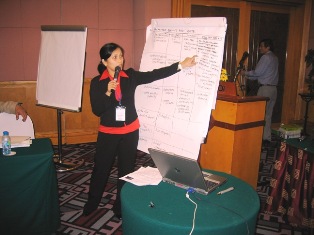It is tempting to envision a colorful complex basin planning map as the end product of years of technical planning. But, in fact, things change over time and institutions that manage a basin plan need to be flexible enough to respond while keeping their principles and goal clear.
Learn, Adapt and Innovate Along the Way
Institutions, processes and strategies for water resource management must be flexible and adaptable. They should continually seek new information and be ready to adjust course as knowledge advances, new priorities are set, and opportunities arise. Perfect planning is impossible because data are never complete and the world is constantly changing.
For example, in the Pangani River Basin, a fine plan unexpectedly lay dormant for years while local proponents wooed funders to help put it into operation. In the end their work and patience paid off. In Botswana, the administrators of the Okavango Delta Management Plan didn’t see what water management had to do with AIDS and gender issues, but a persistent activist got these issues inserted and the water managers found their constituents more responsive to water planning when it was combined with social and health issues.
Projects: Pangani River Basin, Okavango Delta, Mekong River Basin
Stories from the field:
- Small budgets – Tanzania’s Pangani River Basin Project developed its project and funding as understanding grew.
- Decisive data overhauls divisive dams –Several major projects in Nigeria clashed and were put on hold until a water audit showed what was actually possible.
- Mainstreaming HIV and AIDS, gender and poverty – Social issues were infused into Botswana’s Okavango Delta Management Plan two years after its inception.
- Upper Mekong development – IUCN and the Government of Laos monitor a fast changing situation in which opening an area to freighters resulted in a whole village collapsing from bank erosion.
Related WANI Toolkits:
NEGOTIATE: Chapter 4 - Consensus Building, Chapter 5 - Agreements
PAY: Chapter 6 - Learning from Partners and Experience
RULE: Chapter 5 - Implementing Water Governance Capacity
SHARE: Chapter 6 - Implementing Cooperative Transboundary Water Management
